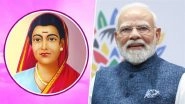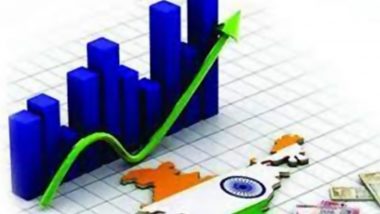Mumbai, August 11: India will celebrate its Independence Day on August 15. In 1947 India achieved freedom from the British Raj after a century-long struggle. The night before India got its independence, the first Prime Minister of India, Jawaharlal Nehru, delivered a historic speech titled 'Tryst With Destiny'. However, the journey after attaining full freedom was not easy. As of 2023, India ranks fifth among the Top 10 Largest Economies in the World. It took major economic reforms post-independence for India to attain this position. On Independence Day 2023, let's know a few major economic reforms that changed the course of the Indian economy.
Ever since gaining complete Independence on August 15, 1947, the economic ecosystem of India has undergone extreme overhaul at all levels. The transformative economic reforms in India significantly altered the global outlook of its economy. Initiated in 1991 under the premiership of PV Narasimha Rao, these reforms have led to a remarkable evolution and expansion of the services sector. The Indian economy experienced a substantial upswing following its liberalisation and implementation of impactful alterations in the trade framework. Let's take a look at the economic reforms India implemented after gaining independence that changed the course of the Indian economy. Independence Day 2023 Special: From Operation Vijay to Surgical Strike and Operation Black Tornado, List of Daring Military Operations Conducted by Indian Armed Forces Since 1947.
Major Economic Reforms That Changed Course of Indian Economy
Nationalisation of Banks:
The then Prime Minister Indira Gandhi took a major step in the history of independent India by nationalising 14 banks after the growing demand for nationalisation of banks in 1969. This step was necessitated by insufficient credit availability and the sluggish pace of sector growth. The nationalization of banks has played a role in shaping the contemporary scenario, leading to a proliferation of private entities venturing into the banking domain. This trend includes the establishment of Non-Banking Financial Institutions (NBFCs) and Banking Financial Institutions (BFIs).
Abolishment of Privy Purse in India in 1971
The Privy Purse constituted a payment arrangement extended to the erstwhile royal households of princely states. It formed a pivotal component of their agreements for integration with India in 1947 and subsequent state mergers in 1949. These agreements signified the relinquishment of their ruling authority. However, after the reforms in the 26th Amendment in 1971 during Prime Minister Indira Gandhi's tenure, the concept of a Privy Purse ceased to exist following. This amendment effectively nullified all privileges and allowances previously granted by the Central government. The discontinuation of the Privy Purse averted the allocation of taxpayers' funds to royal families without a valid basis. Independence Day 2023 Special: From APJ Abdul Kalam to TN Seshan and Kalpana Chawla, 10 Indians Who Achieved Exceptional Success and Made India Proud Post Independence.
1991 Economic Reforms
The 1991 Economic reforms in India were founded within the democratic framework of India and pushed forward by the then PM P. V. Narasimha Rao, who employed Manmohan Singh as his finance minister to embark on a historic economic transition. These reforms concentrated on the listed factors - Liberalisation, Privatisation, Globalisation. The Government of India endeavoured to liberalise the economy by implementing these measures, facilitating India's transition from the previous Soviet-style economy to a market-oriented economy. The main objective of the Economic reforms in India 1991 was to penetrate the domain of globalisation and drive the economy to be more market-aligned.
FDA
Starting in 2015, the government unveiled new measures to liberalise foreign direct investment (FDI) regulations. These changes effectively opened up opportunities for increased overseas investment in various sectors such as food retail, airlines, private security firms, and defence companies. Additionally, FDI restrictions were eased in several other sectors, including e-commerce related to food products, broadcasting carriage services, private security agencies, and animal husbandry. Independence Day 2023 Special: How Indian Armed Forces Grew Since 1947 To Become World's 4th Best and Strongest Military Today.
Black Money Bill
Lok Sabha, on May 11, 2015, passed a bill aimed at addressing black money held overseas, concurrent with the government's revelation of a distinct Benami Bill in the works to tackle black money within the country. The bill entails the possibility of imposing stringent imprisonment sentences of up to a decade for those found guilty of such offences.
Demonetisation
Prime Minister Narendra Modi's demonetisation announcement on November 8, 2016, took the entire country by surprise. The initiative was launched to suppress the circulation of black money, maximise cash infusion into the banking system, eliminate counterfeit currency, and block any funding sources susceptible to use in terrorist activities. The government directed citizens to deposit any currency notes of Rs 500 and Rs 1,000 denominations into their bank accounts.
GST
On August 3, 2016, the Rajya Sabha successfully passed the Goods and Services Tax (GST) Constitutional Amendment Bill, a legislation that had already received approval from the Lok Sabha the previous year. The precise tax rate is anticipated to be determined in the forthcoming weeks or months. The principal aim behind implementing the GST is to streamline and alleviate the burden of excessive taxation. This unified indirect tax is imposed uniformly on goods and services throughout a nation. Independence Day 2023 Special: From Launch of India's First Satellite Aryabhata to Chandrayaan 3 and Mars Mission, List of ISRO's Major Achievements That Made India Proud.
In good news for Indians, the IMF projected the Indian economy to grow at 6.1% in 2023. “Growth in India is projected at 6.1% in 2023, a 0.2 percentage point upward revision compared with the April projection,” it said in its latest update of the World Economic Outlook.
(The above story first appeared on LatestLY on Aug 14, 2023 06:00 AM IST. For more news and updates on politics, world, sports, entertainment and lifestyle, log on to our website latestly.com).













 Quickly
Quickly


